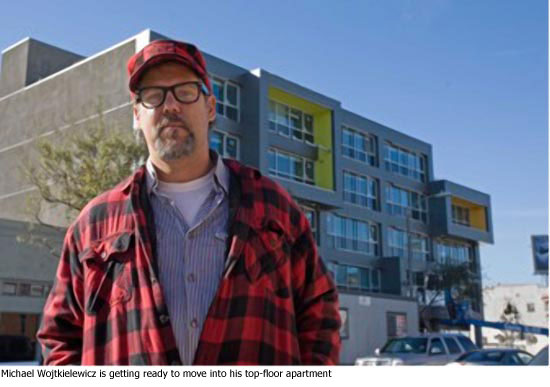In WeHo, a new home and new hope
February 10, 2010
After living with a succession of friends and relatives for more than three years, no wonder Michael Wojtkielewicz gets passionate when he talks about landing an apartment of his own.
“It’s going to mean everything to me,” he says. “There is a huge security knowing you have a home. It’s yours today and it will be yours tomorrow.”
At age 47, the retired architect is preparing to move later this month into the Sierra Bonita Apartments in West Hollywood, an innovative 42-unit mixed-use project on Santa Monica Boulevard for low-income disabled residents like Wojtkielewicz. With his schnauzer named Psquared, Wojtkielewicz aims to turn his new place into the first stable home he’s had since losing his job and apartment several years ago after he was leveled by the onset of stress-related immune illness and bipolar disorder.
The West Hollywood Community Housing Corporation project, which is still under construction, will be home to residents with physical and mental disabilities, along with those who suffer such chronic illnesses as diabetes and HIV/AIDS, says Executive Director Robin Conerly. WHCHC and another non-profit will take up shop in the building’s street-level commercial space.
Residents will move in starting in mid-February. Their rents will be fixed at two amounts, based on a tenant’s income. Those who make 30 percent or less of the county’s median income as calculated by federal housing officials (about $48,000) will pay $382 per month; the cost will be $531 for residents with incomes up to 40 percent of the county median. The one bedroom units can accommodate single tenants, couples and families with one child.
Wojtkielewicz, who’ll live on the fifth floor—the top floor—knows he was “really, really lucky” to get one of the apartments. He was one of 2,017 applicants. His name came up No. 11 in a September lottery.
Wojtkielewicz is hoping that his good fortune is a sign that his life is turning around after a run of painful years.
Wojtkielewicz had been a residential and commercial architect at a series of L.A.-area firms for 20 years when he was stricken with a stress-related immune disorder in 2005. The illness caused painful staph infections on his chest, arms and legs. Separately, he was diagnosed with bipolar disorder.
Around the same time, he lost his job when clients dried up at the two-man design firm, where he’d been working as a contract architect.
In pain and “mentally pretty much shattered,” Wojtkielewicz says he couldn’t bring himself to look for another job. Low on savings, he gave up his apartment of 16 years and moved to a friend’s place in 2006. “When you can’t work,” he said, “you’re no longer able to pay rent.”
He shifted between homes in Los Angeles and West Hollywood, and also took up residence with family members in Pennsylvania. For the last year, Wojtkielewicz has lived with a sick friend in Silver Lake, acting as his caretaker.
Things began looking up last winter when the friend told Wojtkielewicz he’d seen the Sierra Bonita construction site and learned it was reserved for low-income disabled people. The two hopped on a bus to have a look. Wojtkielewicz liked what he saw and signed up for the lottery. By then, he’d qualified for a federal Supplemental Security Income disability payment of $1,335 a month.
With his architectural training, Wojtkielewicz is excited about living in the stylish new building with floor-to-ceiling windows and a rooftop garden. Designed by architect Patrick Tighe, the $20.7 million project uses such state-of-the-art green-building features as interior courtyards that circulate cool air, high-efficiency air conditioning and artistic grids of solar panels on the roof and exterior walls. Its development became a pilot project for West Hollywood’s 2007 green building ordinance.
Among the projects funders are the city of West Hollywood, which put up $6.5 million, and Los Angeles County, which supplied a combined $14 million in loans and bonding authority through the Community Development Commission.
To make sure residents get the help they need, a services coordinator from Jewish Family Service will work at the building. The L.A. Gay & Lesbian Center and AIDS Project LA plan to provide HIV/AIDS care and other services.
Now Wojtkielewicz says he wants to give back a bit of what he’s been given. So he plans on volunteering for a social services agency. He says he also wants to reconnect with friends that he’s lost touch with since his troubles began. “I think having [my own place] is going to make me want to participate in new activities,” he says confidently.
Maybe that’s why he sent a note of gratitude to Lee Meyers, WHCHC’s director of residential services. In it, he quoted a tagline from an IKEA ad he remembered fondly that now rings with a special resonance for him: “Home – The Most Important Place in the World.”













 405 bridge work causes a stink
405 bridge work causes a stink

